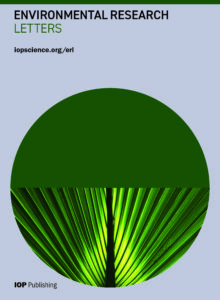ERL特刊征稿|Focus on Next Generation of Water Economics

特刊详情
客座编辑
- Edoardo Borgomeo,英国剑桥大学
- Archisman Mitra,国际水资源管理研究所
- Fabiola Alvarado,英国牛津大学
- Safa Fanaian,澳大利亚国立大学
- Djiby Thiam,南非开普敦大学
- Dustin Garrick (Advisor),加拿大滑铁卢大学
- Soumya Balasubramanya (Advisor),世界银行
主题范围
This focus issue collects perspectives, empirical analyses, and modelling studies from researchers working to advance the economics of water at multiple, nested scales, from the local to the transboundary.
Submissions from a wide variety of disciplinary backgrounds are welcome, and scholars from the Global South are particularly encouraged to contribute.
Some examples of the methods, applications, and perspectives we hope to address in this focus issue include the following:
- Exploring the opportunities for and limitations of behavioural responses of water users to pricing, quantity restrictions and informational interventions.
- Assessing distributional implications of water policy and investments, including on freshwater ecosystems.
- Complementing formal (e.g., piped water supply) and informal (e.g., water vendors/informal water markets) solutions to close agricultural water needs, and clean drinking water supply and sanitation gaps; including examining options and risks.
- Demonstrating the limitations of generic economic prescriptions based on assumptions about allocative efficiency and rationality in addressing complex water challenges.
- Exploring the role of technologies and smart management practices in supporting sustainable water resources management.
- Developing quantitative tools to support water-related decision-making processes.
- Exploring practical experiences related to implementation of approaches such as assigning/reforming property rights, water tariffs or repurposing subsidies.
- Assessing the complementarity of public, private, and community roles in devising and implementing economic policies for water, and in scaling financial, technological, and/or institutional innovations for SDG6.
- Incorporating the evolution of water institutions and governance in water resources system analysis and planning.
- Examining the economics of transboundary and multi-level water management challenges, which include regional and global public goods related to water and virtual water.
- Exploring the relationship between gender and water in economics.
- Exploring approaches rooted in justice-related frameworks (e.g., human right to water and sanitation, intergenerational justice, legal rights of nature, procedural justice).
投稿流程
特刊文章与ERL期刊常规文章遵循相同的审稿流程和内容标准,并采用同样的投稿模式。
有关准备文章及投稿的详细信息,可以参阅IOPscience页面的作者指南。
作者可登入期刊主页进行在线投稿,先选择“文章类型”,然后在“选择特刊”的下拉框中选择“Focus on Next Generation of Water Economics”。
投稿截止日期:2024年5月3日。
期刊介绍

- 2022年影响因子:6.7 Citescore: 10.1
- Environmental Research Letters(ERL)以金色开放获取模式出版,作者可选择将原始数据作为补充资料与文章一起发表。所有研究人员可以免费获取这些研究成果。ERL汇聚了关注环境变化及其应对的研究团体和政策制定团体的意见,涵盖了环境科学的所有方面,出版研究快报、综述文章、观点和社论。ERL顺应了环境科学的跨学科发表的趋势,反映了该领域相关的方法、工具和评估战略,得到了来自不同领域的广泛贡献。
